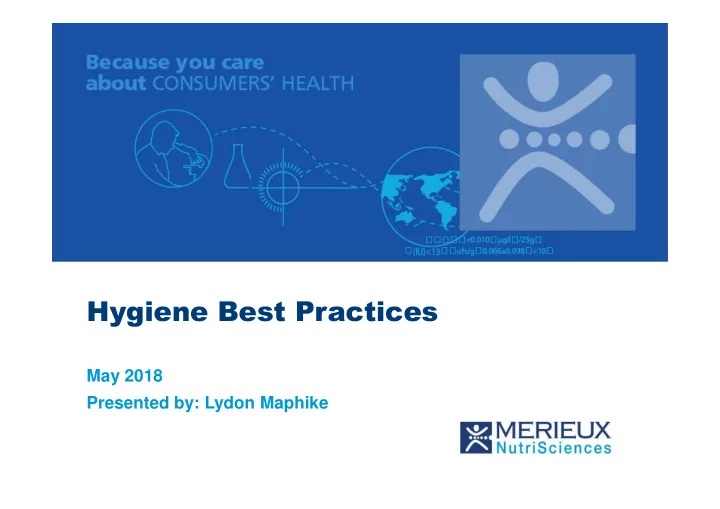

����������������������� May 2018 Presented by: Lydon Maphike
�������� � Introduction to Hygiene Principles � Spotlighting the following Micro organism: � Legionella � Listeria 2
��������� ���������������������� � Food safety is a scientific discipline describing handling, preparation, and storage of food in ways that prevent foodborne illness. This includes a number of routines that should be followed to avoid potential severe health hazards 3
�������������������������� � Consumers expect their food to be safe � Approach the principles in a systematic manner: � Identify potential sources of contamination � Determine what control needs to be put in place � Implement the control measures � Evaluate if the control measure implemented is working effectively 4
������������������������ � Personal Hygiene � Good house keeping practices � Prevent cross contamination (e.g. Zoning, Allergen Management) � Cleaning and sanitation � Waste management � Pest control � Maintenance � Storage practices � Inspections and training � Record and documentation � Testing (Micro Testing), Retention samples � Supplier Quality Assurance 5
������������ ������������������ ���!������ 6
����!������"���������������#� � Your company must exercise control over the production process � What checks are performed? � Temperature, colour, appearance, etc. � Compliance to specifications � Don’t forget corrective actions for non-conformances � What forms must you complete? � Temp records, weight records (date, time, signature), receiving goods, discarding goods, etc. � What forms must your Supervisor complete? � Checks and inspections (signature) 7
$������##�� � Legionella Risk Assessment � To date, more than 58 Legionella species. � Legionella pneumophila serogroup 1 is the most virulent strain causing the majority of infections. � Causing legionellosis including a pneumonia-type illness called Legionnaires’ disease � and a mild flu-like illness called Pontiac fever. 8
��!���%���������������� 9
$������##��& ������������� ������ � Legionella grows and multiplies in a water system � The contaminated water then spread in droplets small enough for people to breathe it in. � People can get Legionnaires’ disease when they breathe in small droplets of water in the air that contain the bacteria � Legionella travels up to 5-7 km in air � Survives and grows at temperatures between 25 – 50 ⁰ C � High risk individuals: � People over 40 years � Smokers � Men � Cancer patients � Immuno-compromised individuals 10
$������##��� ����������������� ������ 11
'�������!�(������������������������� �������!������ � Legionella 12
���������!��������)��������� � Showers and faucets � Cooling towers / Evaporative condenser � Hot tubs � Decorative fountains and water features � Hot water tanks and heaters � Large plumbing systems � Irrigation systems 13
$�������� � Listeria � What is Listeria? � Listeria is a genus of bacteria with 17 known species � Where does it come from? � It is found in soil, water and some animals, including poultry and cattle. It can be present in raw milk and foods made from raw milk. It can also live in food processing plants and contaminate a variety of processed meats � What conditions does it enjoy? � Listeria can grow in temperature from 4° C (the temp erature of a refrigerator) to 37° C, (the body’s internal temperature) � What are things you can do within your company to prevent cross contamination? � Effective sanitation of food contact surfaces and hands. Ethanol is an effective topical sanitizer against Listeria. Always keep the health of your customers in mind – you are a customer as well � What would you do if you see someone entering the kitchen without washing their hands and use equipment that is not clean? � REPORT, remember peoples lives are at risk. � Take steps to prevent possible Listeria contamination � Re-training staff 14
$���������� � Listeriosis � Listeria infection is a foodborne bacterial illness that can be very serious for: � Pregnant women � People with impaired immune systems. � Elderly � Babies (born/unborn) � Listeria infection is most commonly contracted by eating improperly processed deli meats and unpasteurized milk products. � Prompt antibiotic treatment can help curb the effects of listeria infection. 15
'�������!�(������������������������� �������!������ 16
����������!����� ����(�#������� � Adhere to the rules set out within the Regulations and company � Follow the Hygiene Principles set out by the company � Conduct checks and inspections � Follow the correct cleaning methods � Keep retention samples � Conduct routine inspections � Report incidents � Equip yourself with the knowledge � Maintain records 17
�!����������������!���%����� 18
�!����������������!���%����� Laboratory Services • ISO 17025 Accredited Laboratories Microbiology, Chemistry/Nutritional & Raw Milk Testing • • Sampling, Swabbing & Problem Solving • Sample Collection Education Services • Quality Management Systems (QMS) & Product Safety Training Courses • Floor Worker to Management Level • On-Site or at our Venue • FoodBev SETA Accredited Service Provider • DVDs & Posters • E-Learning Consulting & Problem Solving Services • Hygiene Auditing • QMS Auditing & Implementation Support • Allergen Risk Management • Legionella Services • Food Labelling Consulting • Problem Solving • Physical Testing & Sensory Evaluation 19
*+���!,��!����������� 20
Recommend
More recommend